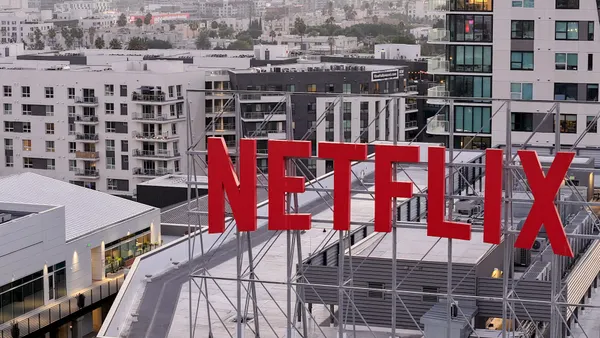Update: Oct. 20, 2020: The Justice Department filed an expected federal antitrust lawsuit against Google Tuesday, setting up one of the biggest regulatory battles to hit Big Tech in decades. The complaint, backed by 11 Republican state attorneys general, invokes Section 2 of the Sherman Act and centers on Google's alleged outsized control of the online search market, including through search advertising, calling the company's practices "anticompetitive and exclusionary."
The news marks the first time the Alphabet-owned division has had to contend with a major antitrust lawsuit in the U.S. The outcome of the case, which could take years to sort, has the potential to reshape how the largest steward of online advertising operates, and carries serious implications for the broader digital media ecosystem.
Dive Brief:
- The Department of Justice (DOJ) could bring an antitrust lawsuit against Google as early as this summer, with the tech giant's advertising technology a point of emphasis in the case, The Wall Street Journal reported, citing people familiar with the matter. Attorney General William Barr has continued to prioritize a probe of Google despite disruptions to DOJ operations caused by the coronavirus pandemic.
- Some state attorneys general, including Texas Attorney General Ken Paxton, a Republican, are likely to file a case against Google in the coming months as well, the Journal's sources said. State-level investigations have centered on Google's ad business, while the DOJ is closely examining the firm's dominance of the search engine market. The federal government has shared some of its findings with states like Texas, some of the Journal's sources said.
- It's unclear at the moment whether states will file individual complaints or join the federal case once it's put into motion, per the Journal. The report noted that no final decisions have been made in either regard, and that it's possible that the matter will be settled with no litigation. However, both state governments and the federal government are far along in planning for litigation, the Journal said.
Dive Insight:
With revenue already under pressure due to the pandemic, Google could soon be grappling with more existential issues surrounding its business, which in recent years has found itself increasingly in the crosshairs of bipartisan antitrust concerns.
A federal lawsuit, coupled with the potential for multiple state-level complaints targeting different aspects of Google's operations, would create a complicated legal headache and significant public scrutiny for the Alphabet-owned company. It's a scrutiny many publishers and independent ad-tech players long frustrated by Google's industry dominance would welcome.
Google has pushed back against monopolistic allegations by pointing to growing competition in the digital advertising sphere from companies like Amazon, Facebook and Oracle. It has called the ad-tech sector "famously crowded," according to a Bloomberg report that details the growing body of research against Google's stature. However, Google and Facebook together hoovered up more than half of total U.S. digital advertising dollars spent in 2019, according to eMarketer estimates.
While Google isn't wrong to highlight how vast and complicated the ad-tech ecosystem is, many ad-tech companies, along with news publishers, rely heavily on Google products like search to reach users and drive revenue for their business.
Google isn't alone among big tech firms feeling a harsher antitrust spotlight amid the pandemic. Facebook's acquisition of the image-sharing platform Giphy has raised alarm on both sides of the political aisle in Congress, according to The Verge. Though Facebook's announcement of the acquisition indicated that the social giant would preserve rival platforms' access to Giphy — companies from Twitter to Slack have integrated its GIF-sharing functionality — lawmakers immediately expressed skepticism.
The reportedly $400 million deal has received criticisms from Sen. Josh Hawley, R-Missouri, and Sens. Elizabeth Warren, D-Massachusetts, and Amy Klobuchar, D-Minnesota. In a statement to The Verge, Hawley compared the deal to Google's acquisition of DoubleClick, saying both represent a bid to collect more data on consumers.
At the same time, the pandemic has heightened awareness of industry consolidation. Sen. Warren and Rep. Alexandria Ocasio-Cortez, D-New York, earlier this year proposed a "Pandemic Anti-Monopoly Act" that would restrict M&A transactions involving large companies, including businesses with more than $100 million in revenue. The bill is being positioned as relevant in the wake of the Giphy deal.
"Facebook's acquisition is yet another example of a giant company using the pandemic to further consolidate power - this time it's a company with a history of privacy violations gaining more control over online communications," a Warren spokesperson said in a statement to The Verge.
While both Republicans and Democrats are critical of Google and Facebook, the former camp broadly disfavors changes to antitrust laws. In a recent letter addressing the DOJ and FTC, Republicans wrote that any attempt to curtail M&A activity is "part and parcel of the latent socialism embraced by many modern Democrats," per The Verge.












